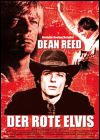
Red Elvis
German Documentary, Tom Hanks Movie about American Crooner aka "Comrade Rockstar"
 Denver-born
singer
Dean Reed
never made it big in the West, but in Moscow he was known as "Comrade
Rockstar", and had a huge following in eastern Europe, South America, Iraq
and Lebanon. His concerts were foot-stomping sell-outs from Santiago to
Baghdad, Warsaw to Helsinki, Budapest to East Berlin in the 1960s and ‘70s.
Denver-born
singer
Dean Reed
never made it big in the West, but in Moscow he was known as "Comrade
Rockstar", and had a huge following in eastern Europe, South America, Iraq
and Lebanon. His concerts were foot-stomping sell-outs from Santiago to
Baghdad, Warsaw to Helsinki, Budapest to East Berlin in the 1960s and ‘70s.
But, in later years, with his career in decline, his marriage shaky and little prospect of his securing work if he returned to the US, a despairing Reed drove his car to a Berlin lake and drowned himself.
That was on June 17 1986. Now, some 20 years later, a documentary movie about the rise and fall of Reed, who was a friend of Salvador Allende, Yasser Arafat and Daniel Ortega, was recently screened at the Berlin International Film Festival. The 95-minute-long film, "Dean Reed - The Red Elvis", attracted a lot of attention from people living in the eastern half of the city, some of whom knew Reed personally and regularly attended his concerts 25 years ago.
A star in the GDR: Reed in 1977. Photos: www.deanreed.de
As the film’s director, Dresden-born Leopold Grün put it: "Reed’s life was a mosaic dominated by his longing for success and his naive political engagement at a time when the world was divided by two major ideologies."
By the time he was 23, the 1938-born Reed had dreams of becoming an Elvis Presley-style singer in the United States, and even recorded ballads and country-style protest songs on the Capitol label, albeit with little success. Yet when he discovered his records were selling well in Latin America he began touring extensively in Chile, Argentina, Bolivia and Brazil. By the late 1960s he was mobbed wherever he went, as Grün’s movie colourfully illustrates.
Reed, the pacifist, ripened into a Marxist in the revolutionary climate of South America. He campaigned for Salvador Allende, and was pictured congratulating him at his inauguration ceremony as Chilean president in Santiago in 1973.
By 1974, Reed was performing in the Soviet Union and across eastern Europe. Interviewed in the film, Egon Krenz, who briefly succeeded Erich Honecker as East German head of state in late 1989, says that after Reed’s arrival in East Berlin in the early 1970s, he was told what would be expected of him. Soon Reed was busy visiting schools, factories and clubs, singing his protest songs and spreading the gospel of Marxism to young and old alike. In return, he enjoyed a privileged life, living in a lakeside bungalow in Schmöckwitz on the eastern outskirts of Berlin, for which he paid only a nominal rent.
Aside from family members, contemporaries featured in the documentary include acclaimed German actor
Armin Müller-Stahl, Isabel Allende, director Celino Bleiweiss, Chilean Radio DJ Chucho Fernandez and American radio host Peter Boyles. Müller-Stahl talks about Reed’s immense popularity in the former East Germany at the time: "He had an audience here, and perhaps he could also have had one in America had he decided to stay there.""For young East Germans Dean Reed was, with his charm and handsome looks, an American hero for us in cut-off East Berlin," said a middle-aged woman after seeing the film. "It didn’t matter that his voice was not that special. He’d chosen to live among us. We liked that."
But attitudes towards the singer eventually changed. People gradually tired of his voice, and his unquestioning loyalty to the Soviet Union. On a visit to the US in the mid-1980s, Reed upset Americans by swearing allegiance to Moscow while at the same time hinting that if folks were nice to him, he might even consider returning home for good. They weren’t. Following an appearance on CBS TV’s 60 Minutes show with famed anchorman Mike Wallace, furious American viewers called and wrote in to brand him a "Commie stooge".
Back in East Berlin, Reed’s third marriage, to East German actress Renate Blume, was in trouble. In a taped message made after the singer’s suicide, Blume’s voice is heard saying how, on two successive nights, she and Reed were involved in fierce arguments. The first night he tried slashing his wrists, the next night he left the bungalow in a temper with some of his belongings. That was, claimed the actress, the last she saw of him. Several days later his body was recovered from the lake, along with a suicide note.
Reed’s widow does not appear in the film. Grün says this is because the actress has sold the film rights to the Reed story to Oscar-winning Hollywood actor
Tom Hanks, who plans to make a full-length feature film on the singer’s life. (dpa)Links:
Dean Read, The Iron Curtain Elvis (Spiegel Online International), including photo gallery
